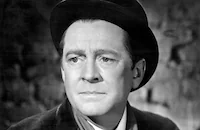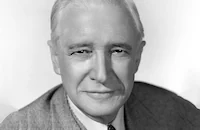Have a Heart

Brief Synopsis
Cast & Crew
David Butler
Jean Parker
James Dunn
Una Merkel
Stuart Erwin
Willard Robertson
Film Details
Technical Specs

Synopsis
On the eve of her wedding, children's dance instructor Sally Moore entertains her finace, Joe Lacy, and his boisterous male friends in her apartment. Convinced that being photographed before the wedding will bring her bad luck, Sally runs playfully from a would-be cameraman to her balcony and, when the balcony railing gives way, falls to the street below. Sally survives the fall but is told by her physician, Dr. Spear, that because of damage to one of her knees, she must always wear an enormous orthopedic shoe. When Joe first sees Sally in the hideous shoe, he blanches, but assures her that he will do his duty and marry her. Sally, however, refuses Joe's forced charity and ends their engagement. Later, Sally catches the eye of ice cream vendor Jimmie Flaherty, who flirts with her through her apartment window. Unaware of Sally's condition, Jimmie asks her to go dancing the next night and, at the urging of her roommate, beautician Joan, she accepts. Sally then learns from Dr. Spear that a famous Viennese orthopedic surgeon will be coming to town for a brief stay and will do corrective surgery on her leg if she can raise five hundred dollars. At the same time, Jimmie is promoted by his boss, Schauber, to district manager of the Have a Heart ice cream company. Ecstatic, Jimmie borrows a friend's car and picks up Sally, who is standing on the corner wearing a big galosh on her good foot to match her orthopedic shoe. After Sally convinces Jimmie that dancing will bring them bad luck, the couple spends the entire evening driving around town. During their date, the hot-tempered Jimmie fights with a man in white shoes for kicking Sally's dog Mopsy, and Sally lectures him about controlling his anger. Later, Jimmie returns to the Have a Heart warehouse with Mopsy just as a robber is stealing from the company safe. As Mopsy barks at the burglar, Jimmie observes a silver dollar tattoo on the robber's hand, but is unable to stop him from fleeing with four hundred dollars. The next day, Sally sells four dozen dolls she has made to a neighborhood store and puts the money away for her operation. Jimmie then shows up unexpectedly at Sally's apartment and sees Sally's leg. To Sally's joy, however, Jimmie is nonplussed about her disability and assures that he still loves her. At that moment, Schauber arrives with two detectives and accuses Jimmie, who was seen at the warehouse by the night watchman, of the robbery. After Schauber tells him that if the money is returned within twenty-four hours, he will not be prosecuted, Jimmie is jailed. Desperate to free Jimmie, Sally gives Schauber her $400, but makes him promise not to tell Jimmie about the donation. Jimmie is released and learns about Sally's deed from Schauber's secretary, who implies that Sally suspects him of the crime. Unaware of the operation she has sacrificed for him, the prideful Jimmie denounces Sally and ends their romance in a huff. Joan and her lazy, unemployed boyfriend Gus then try to win the operation money in a gambling scheme, but their racehorse runs off the track just before the finish line. On the way out of the racetrack, however, Mopsy attacks a man in white shoes, who Gus discovers has a silver dollar tattoo on his hand. After Gus exposes the man as the robber and is made a police detective, Sally undergoes a successful operation. However, because Jimmie has taken a job on a steamer and is still angry with her, Sally's recuperation stalls. With help from Schauber, Gus and Joan, Sally eventually is reunited with an apologetic, wiser Jimmie and runs from her wheelchair into his arms.

Director
David Butler
Cast

Jean Parker

James Dunn

Una Merkel

Stuart Erwin
Willard Robertson

Samuel S. Hinds
Paul Page
Muriel Evans
Kate Price
Pepi Sinoff

Edward Brophy
Katherine Clare Ward

Juanita Quigley
Ray Cooke
Charles Gregg
Teddy Hart
Robert Homans
Russ Clark
Jack Stoney
Roy Brown

Brandon Hurst
Hector V. Sarno
Frank Moran
William Wagner
Charles Moore
Burr Carruth
Frank O'connor
J. P. Mcgowan
Tom Dugan
Billy Erwin
Olaf Hytten
Tommy Bupp
Elise Cavanna
Bobby Caldwell
Al Hill
Crew
David Butler
John W. Considine Jr.
B. G. Desylva
Cedric Gibbons
James Wong Howe
Ben Lewis
Florence Ryerson
Ad Schaumer
Douglas Shearer
Jack Virgil
Edwin B. Willis
Edgar Allan Woolf
Joseph Wright

Film Details
Technical Specs

Articles
Have a Heart -
By Richard Harland Smith

Have a Heart -
Quotes
Trivia
Notes
M-G-M borrowed writer and director David Butler and actor James Dunn from Fox for this production. According to a Hollywood Reporter news item, the "twenty Meglin Kiddies" were cast in the film, but their participation in the final film has not been confirmed. Although the Call Bureau Cast Service lists Douglass Dumbrille in the part of "Schauber," Willard Robertson actually played the role. According to a July 1934 Hollywood Reporter news item, because the project had been promoted as a musical, Nacio Herb Brown and Arthur Freed wrote a song for Jean Parker to sing called "A Little Ray of Sunshine." The song, however, was not heard in the viewed print.















